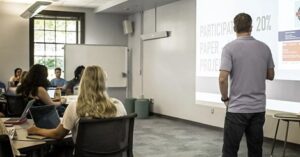 Q: What has been the most surprising thing about being back in school?
Q: What has been the most surprising thing about being back in school?  Q: What has been the most surprising thing about being back in school?
Q: What has been the most surprising thing about being back in school?
A: The most surprising thing back at school has been … me! After I finished my undergrad degree, I swore that was the last formal education program I would do. Now 6 years later, I realize I didn’t appreciate the things that higher education offers, such as open-minded discussions, a constant stream of new and exciting stimuli through movies, readings, and class discussions, and the spirit of potential that permeates campus. I recently attended my first on campus class at UNC (online student, hah) in August and I was surprised to realize I really missed that feeling of people and resources set aside just to learn and grow.
Q: How has your perception about the MPA changed since starting?
A: I chose the MPA@UNC program because I knew I needed a professional degree, and I wanted a program which would carry weight and respect in my area and field of study. I came into the program knowing this would be hard work, but that it would be a degree worth earning. Since Jan (when I started) I am just starting to learn all the other things UNC offers aside from the rigorous and respected curriculum; the opportunities. With the mentor program, the extracurricular discussion groups, and engaged faculty and staff, I truly am learning that this program is really shaping me and supporting me in my journey to become a better leader.
Q: What has required the most adjustment since being back in school?
A: The last time I was in school I worked a couple days a week at a coffee shop, and took a full course load on my days off. This time around I’m working Monday through Friday and taking classes in the evening, so that has been a shift in my scholastic experience. Giving up my personal time in the evenings and some weekend hours has certainly been an adjustment.
Q: What classes are you enrolled in this Fall?
A: This semester I’m taking PUBA 710 – Organizational Theory and PUBA 719 Public Administration Analysis and Evaluation 1. Organizational Theory has been interesting because I’ve been able to see how the social mindsets of generations have influenced theories about productivity and it’s giving me a sense of how contemporary generation’s values and mindsets may help me to create the type of work environments they prefer. Analysis and Evaluation has been heavy reading, but I’m really enjoying learning about the academic case study and research process in a formal process. Research has always been an implied skill with other classes, but discussing the process in a formal setting is helping me fill in the cracks for the habits I developed in my undergrad days.
Q: Do you have a favorite moment of the program so far?
A: My favorite moment so far, is a bit of a culmination moment. In April a few students put together a meeting with other MPA students interested in pursuing Arts related careers. I was able to attend the conversation, and I reached out to the three students who organized it to thank them for putting it together. In August I attended my first on campus class and when I walked into the room I saw so many students I knew already! There were classmates from the several classes I’ve taken online and even a couple of the student organizers from the Arts Conversation. It was a small thing, but it really solidified my feelings and experiences at UNC so far, and it was a nice way of realizing, this really is where I belong.
Stephen Thompson, a current UNC MPA student will be offering his take as he navigates the public service field and public administration coursework. We look forward to his blog contributions this year. Meet Stephen!
This post was written by Stephen Thompson.
Hey, everybody!
I’m Stephen Thompson, a 2nd year student in the MPA@UNC program (yup, the mysterious online program!) and this year’s student writer for the MPA Matters Blog. I’m excited to dive in and explore the world of UNC’s MPA program through interviews, spotlights and articles featuring MPA students, alumni, faculty and staff members, and community members around North Carolina who are working in the government and nonprofit companies of today. –But I’m getting a little ahead of myself.
I’m a professional musician, turned arts administrator (what independent artist isn’t?), and recent transplant to North Carolina. My origin story has some twists and turns, so buckle up as we go all the way back to 2014.
*Wavey Flashback Sequence*
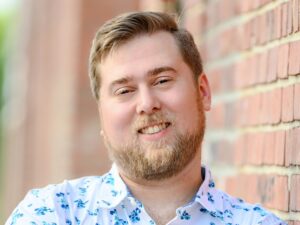 After finishing my undergraduate degree at George Mason University, in Fairfax, VA I moved to Baltimore, MD to pursue a full-time career as an Alt. Country singer/songwriter. Living the life of a struggling performer I soon learned that for every 40 minutes you get on stage to wow audience members and soak up the spotlight there were hours upon hours of administrative work. Hours spent booking gigs, making and distributing marketing materials, arranging logistics (like discount hotel rooms and frequent oil changes), not to mention rehearsing (you still have to sound good when you finally get to the show), as well as getting merchandise designed, printed, and ordered. Managing my career was a whole separate job from just being the performer myself! Over the next three years I learned a lot about all aspects of arts administration from how to tell a long story to distract the audience from yet another equipment malfunction, to how to find artist resources through arts councils, nonprofits, and even government grant programs.
After finishing my undergraduate degree at George Mason University, in Fairfax, VA I moved to Baltimore, MD to pursue a full-time career as an Alt. Country singer/songwriter. Living the life of a struggling performer I soon learned that for every 40 minutes you get on stage to wow audience members and soak up the spotlight there were hours upon hours of administrative work. Hours spent booking gigs, making and distributing marketing materials, arranging logistics (like discount hotel rooms and frequent oil changes), not to mention rehearsing (you still have to sound good when you finally get to the show), as well as getting merchandise designed, printed, and ordered. Managing my career was a whole separate job from just being the performer myself! Over the next three years I learned a lot about all aspects of arts administration from how to tell a long story to distract the audience from yet another equipment malfunction, to how to find artist resources through arts councils, nonprofits, and even government grant programs.
By 2017 I found myself feeling very proud of my accomplishments on the artistic/professional front, but also a little bored. I had learned so much and accomplished everything I set out to do, but now it just felt like going through the motions. Seeking some introspective clarity, I took some time off the road and moved back to my hometown. I felt a little like the famed Portuguese navigator Ferdinand Magellan after he became the first person to circumnavigate the globe; I had traveled so far just to end up right back where I started. I began looking for opportunities to try new things and ultimately, I found myself managing a music lessons center in Northern Virginia. Working with the students, teachers, and community members reignited my passion, and I began to work with county arts programs like the Parks and Rec department’s Park Takes Program which offered greatly discounted music, drama, literature, and visual arts classes to adults and children. I also began to work with local and national nonprofits which promoted arts education through fundraising and legislative reform. I found I had a really unique perspective having been a professional artist and also having worked on front line administration.
Well, eventually my fiancé and I decided to move to the triangle area in North Carolina and I started working for a local arts council. As I began to plan out my professional goals, UNC’s MPA program –with its focus on Nonprofit Management, was an obvious choice. In the coming months I’ll tell y’all about my excitement for arts education, my passion for community, and my strong belief that every single person is a creative, we just have to find their medium of expression, but for now I’ll just say: I’m Stephen, its nice to meet you!
This year, in 2021, I was so thankful to have taken the leap to apply and be selected as one of two scholarship recipients for the NCLGBA Summer Conference. As a young professional, I was excited to join an in-person conference focused on local government; it would be my first. To my dismay, I ended up not being able to join in person. So, to those of you I was not able to meet, *extends virtual handshake*  Hello! I’m Tiffany Oliva, and I am a current student at UNC School of Government pursuing my Master of Public Administration with a concentration in local government. I also have the pleasure of working with the City of Winston-Salem. Even though I have only lived about a quarter of a century, working with the City has been one of the greatest honors of my life. It opened the door into a field that I had not even considered as one BIG way to make public service impact. I hope our paths will get to cross someday soon!
Hello! I’m Tiffany Oliva, and I am a current student at UNC School of Government pursuing my Master of Public Administration with a concentration in local government. I also have the pleasure of working with the City of Winston-Salem. Even though I have only lived about a quarter of a century, working with the City has been one of the greatest honors of my life. It opened the door into a field that I had not even considered as one BIG way to make public service impact. I hope our paths will get to cross someday soon!
Now, back to what you came here for . . . my conference recap! With topics ranging from the American Rescue Plan Act funds to diversity to understanding the historical framework of budgeting and where we may be headed, I learned a great deal (to say the least!). I have experientially seen how important the budgeting process is. I also understand how it is, essentially, the living and breathing document of our local governments’ values and priorities. This conference solidified that for me, but it also made me realize that I should really considered budgeting as a potential career path. That is something I have always had tucked away in my mind, but it definitely brought it to the front of mind.
One of my favorite sessions was on day two: Turning Traditional Budgeting on Its Head. I really enjoyed hearing Andrew Kleine’s presentation. I found myself learning a great deal and also laughing quite a bit. His analogy of the traditional budgeting process to an iceberg with layers building up over time and becoming a slower, heavier mass really made a statement to me about the need for change. Government is increasingly being expected to do more for less, and to move more quickly. Andrew mentioned a theme from David Osborne and Peter Hutchinson’s book, “The Price of Government: Getting the Results We Need in an Age of Permanent Fiscal Crisis,” which was that budgeting should be outcome based. An outcomes-based budget means that you are purchasing results, rather than funding line-items. Three ways that Andrew suggests changing the budgeting process include:
But there were many more takeaways, and lucky for us, we have the opportunity to re-watch the presentations at https://nclgba.org/resource-archive/2021-summer-conference-materials/ .
In closing, I promise Andrew didn’t pay me for this plug, but I will also be picking up City On The Line (one of his books) soon! Needless to say, I certainly built a reading list through the conference that I am excited to dig in and through.
I hope that you enjoyed the presentations just as much as I did! A huge thank you to NCLGBA for allowing me to be a part of it!
Current MPA student Wayne Banks Jr. is from High Point, North Carolina. He attended the University of North Carolina at Charlotte where he received a BS in Business Administration and a BA in Political science. He’s had prior experience working for both for-profit & nonprofit organizations. Recently, he participated as a PAFR Fellow with the Town of Apex to create its first Popular Annual Financial Report for the Government Financial Officers Association. His journey has now taken him to his Professional Work Experience that he’s sharing through this blog post.
This post was written by Wayne Banks Jr.
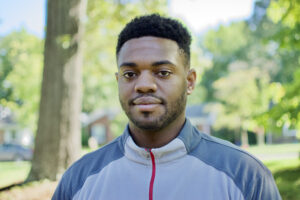 Greetings to all! My name is Wayne Banks Jr. and I am currently a 2nd year online student in the MPA program. The PWE experience can introduce students to opportunities and a practical understanding of the career interests of an individual. For myself, I am interested in the Community Economic Development and Finance & Budgeting career fields that can be a part of Public Administration responsibilities. By way of networking opportunities, I was invited to an interview and received an offer for my PWE as a Budget & Research Analyst at the Finance & Budget Division of UNC Chapel Hill. This opportunity has provided me with a practical experience to the financial responsibilities of a public higher education institution. I am almost half-way through this PWE experience and can tell you that our work in this division is important and exciting.
Greetings to all! My name is Wayne Banks Jr. and I am currently a 2nd year online student in the MPA program. The PWE experience can introduce students to opportunities and a practical understanding of the career interests of an individual. For myself, I am interested in the Community Economic Development and Finance & Budgeting career fields that can be a part of Public Administration responsibilities. By way of networking opportunities, I was invited to an interview and received an offer for my PWE as a Budget & Research Analyst at the Finance & Budget Division of UNC Chapel Hill. This opportunity has provided me with a practical experience to the financial responsibilities of a public higher education institution. I am almost half-way through this PWE experience and can tell you that our work in this division is important and exciting.
My position allows me to assist professional staff with responsibilities that relate to financial decision making and delegation of funds to different schools and organizations on campus. Legislative decisions that are made by the North Carolina General Assembly directly affecting how the university leadership can better serve students, local citizens, businesses, and other parties or organizations that benefit from UNC’s services. Also, I would want to confirm that the lessons you learn in class truly will align with the PWE experience that you make. I’ve already seen connections from our courses in Public Finance, Law, Organizational Theory, and Communications in my PWE.
The staff who work with me, and three other interns are welcoming and provide you with very helpful insight on the finance work that the organization is managing on a day-to-day basis. Their support provides me as well as the other interns with important knowledge on how the roles of each department in the division can affect the overall operations of the university. UNC is basically like a little city and this work experience can be applied to job occupations that are related to public finance responsibilities at a Local Government.
After graduation, I am interested in either working for a local government in their budget or economic development department or working for a nonprofit (for-profit) organization that focuses on real estate development and community revitalization efforts. For concluding remarks, I would encourage individuals to be open-minded to learn new things about themselves through their PWE and other opportunities in the MPA Program. Thank you for making time to read my blog post.
Current MPA student Francesco Tassi writes about his Professional Work Experience this summer. Francesco is a current student in the oncampus format of the MPA at UNC. He is originally from Florence, Italy and received his undergraduate degree from the University of Notre Dame. Francesco’s main interest is supporting public organizations that promote the development of distressed regions and workers.
This post was written by Francesco Tassi.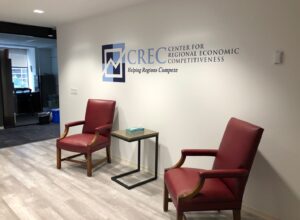
I first heard of my PWE, the Center for Regional Economic Competitiveness (CREC), from Dr. Dabson, a Research Fellow at the School of Government, and in Prof. Morgan’s elective Managing Economic Development. Having researched economic development strategies of North Carolina regional councils for our MPA Research Methods class, I actually ran into CREC’s consulting work for regional councils early on in my MPA. CREC is a nonprofit based in Washington D.C. that develops data products, conferences, policy academies, and consults for states and federal agencies on economic and workforce development. As I write this blog post, I find myself in D.C. about to embark on a new project with CREC to assist the U.S. Economic Development Administration in aligning the state and regional economic development strategies of several states—a far (but related) cry from my MPA research. This summer I helped develop an economic empowerment index to improve the economic mobility of frontline workers in Colorado, modeled the economic impact of Department of Defense (DoD) spending in Louisiana, updated CREC’s state business incentives database for fifteen states (including North Carolina), interviewed Appalachian Regional Commission grantees on best practices for recovery-to-work ecosystems, drafted a weekly newsletter for an association of federal statistical agencies, helped plan and run a federal data conference sponsored by Facebook, and mapped DoD appropriations to strengthen the pipeline between university research and military applications in Texas.
Asides from vastly increasing my knowledge of labor market data (a highlight was informing a successful collaboration on data with Brookings) and related software (IMPLAN, Tableau), CREC’s projects exposed me intimately to a fundamental question every practitioner in the public sector must face—how do we best use and communicate data to inform public organizations? Whether it’s the baseline year for military retiree spending I chose to input into a complex software to inform Louisiana’s legislature, or demographic industry variables debated with colleagues for Colorado’s index—what I cherished was that every decision had input and process. Despite working for a nonprofit, I realized that bureaucratic process, or feedback loops and reviews with clients and colleagues regarding data use and inclusion, is the backbone of all that is good and useful. For both my Texas and Colorado projects I pushed for certain data that took more time to collect. Despite possibly making me the ‘annoying’ intern, I believe this led to slightly more accurate tools for the public sector—which brings me joy.
I’m thankful for Prof. Szypszak teaching us Nexis-Lexis; it came in handy for updating statutes on states’ business incentives. It’s also easy for an MPA student to underestimate their first-year communications class. But when you’re building a 40-variable index for 64 counties and county commissioners, state-level workforce development and higher education departments, as well as industry sector partnerships across Colorado, you fully appreciate that everything needs to be simplified and communicate stories to be useful, despite being complex at its core. Seeing that the work I am helping to create is impacting public agencies, and at the forefront of innovatively tackling economic development challenges across the U.S., is immensely rewarding. Experiencing our nation’s capital despite the lingering presence of COVID-19 has also been a blessing. Commuting every day on the metro is a highlight, something I never thought possible in the age of remote work. I enjoyed my PWE so much that I will continue working with CREC part-time going into my second year as an MPA-MCRP dual degree candidate. I look forward to dive deeper into labor market data, continuously learning from (and deeply thankful for) dedicated colleagues and supervisors at CREC—two of which happen to be Tarheels. Even in D.C. you can’t be too far from UNC!
Current oncampus student Carly Lappas writes about her PWE this summer with Rural Forward NC, a nonprofit organization that works to provide healthier, more sustainable rural communities within NC with an increased capacity to solve their own health problems. Carly Lappas is from Maine and attended undergrad at Bowdoin College.
This post was written by Carly Lappas.
———————————————————————————————–
Non-profit organizations have always interested me because of their ability to fill the gaps between services offered by the public and private sectors. Prior to beginning my MPA degree, I worked for a large and well-established workforce development non-profit in Boston, Massachusetts. When looking for my professional work experience (PWE) I knew I wanted to stay in the non-profit sector, but was interested in learning more about small, grassroots organizations and how they interact with their communities. With guidance from the MPA career services team I found a job posting for Rural Forward North Carolina (RFNC) and knew I wanted to apply. RFNC in a non-profit that supports leaders and organizations in rural communities across the state to help them build capacity and identify opportunities for community collaboration. Many of the programs RFNC assists are start-up, grassroot organizations with deep connections to the communities they serve.

My role at RFNC is focused on Beaufort County, located in the eastern region of the state. Alongside my manager, Andy Shoenig, a UNC MPA alumnus, I help to facilitate two county-wide coalitions dedicated to improving the health and wellbeing of the county. I also recently started supporting Andy in his work with the North Carolina Inclusive Disaster Recovery Network. These coalitions bring together nonprofit directors, government representatives, church leaders, health care providers, and community organizers so that they can learn from and bolster each other’s work. Supporting these coalitions allows me to better understand different types of organizations and how they can work together, while building my skills as a facilitator and consultant.
As I enter into my final weeks with RFNC before classes start up again at UNC, I am so appreciative of the experiences I have had and the community leaders I have met. With COVID restrictions slowly easing, I have been able to travel to Beaufort County to meet with community partners in person and observe their organizations in action. The work they do is reshaping their county and the resources available within their communities, and I am glad RFNC can be thought partners in their work. While I was, and still am, certain I want to build my career in the non-profit sector, my PWE experience has opened my eyes to the multiple avenues I can take, both in terms of the size and scope of organizations, as well as my role, whether it be direct service or consultation.
Current oncampus student MaryBeth Spoehr writes about her PWE this summer with the Town of Holly’s Budget and Finance Department. MaryBeth Spoehr is from Wisconsin and attended undergrad at Michigan Tech University.
This post was written by MaryBeth Spoehr.
———————————————————————————————–
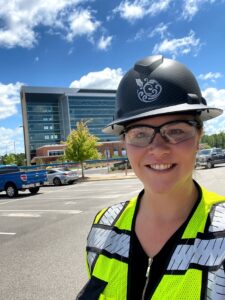
Observing an electrical inspection at the new UNC Rex Hospital in Holly Springs, NC.
From conversations with my Alumni mentor and the Career Services Director, I felt confident going into Professional Work Experience (PWE) interviews that I wanted to work in a local government budget and management position. I find budget and management to be captivating because of the importance of the budget to each local government and I wanted an experience in a position I am passionate about working in now and in the future. I chose to do my PWE with the Town of Holly Spring, NC in the Budget and Management division. This position allows me to grow my abilities as a budget analyst and enables me to gain real-world insights on topics I have learned during my MPA studies such as strategic planning, performance management, and budget development.
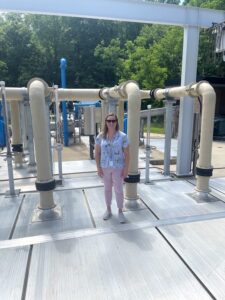
On site at the Waste Water Treatment Plant in Holly Springs, NC.
One of the unique aspects of the budget and management division is that it interacts frequently with all other departments within the town. As a budget analyst, it is important to understand the role and responsibilities of each of the other departments. To help me gain a better understanding, I have participated in several informative tours of different departments in Holly Springs including the Development Services Department, Waste Water Treatment Plant, and the Building Safety and Inspections Division. Through these experiences I will be able to better understand and communicate the needs of the different departments with real knowledge of their duties, responsibilities, and resources. I am also working on the Budget Proposal for the next fiscal year including the Capital Improvement Plans and utilization of the American Rescue Plan. It is my hope that these diverse experiences will lead me into a lifelong career in local government.
If you have ever looked into obtaining your MPA at UNC, you may have come across the acronym ‘PWE’ while browsing our curriculum or attending a webinar. The PWE, which stands for Professional Work Experience, is one of the most important parts of our program and distinguishes us from other programs because it is a required component in our curriculum. A lot of programs out there don’t require an experiential component to their curriculum where students have to go out and practice what they learn in the classroom.
The Professional Work Experience or PWE is (in the most simplest terms) our version of an internship. But, it really is so much more. It is the opportunity to apply the leadership theories you study in class to a current and relevant public sector work environment. The experience is meant to be high level (no coffee fetching here) and provide our students an opportunity to cultivate their leadership or project management skills in a practical setting. 
Summer is a popular time for many of our students to complete their Professional Work Experiences, so we’d like to take the opportunity over the next few weeks to have some of our current students write about their PWE’s. We have 34 students who are currently completing the PWE requirement. Our students represent placements across local, state, and the federal governments as well as nonprofit organizations and the private sector. See the list below for some of our Summer 2021 placement sites, and enjoy the posts by our students over the next few weeks sharing their PWE experiences. Learn about the type of work their doing, the impact they are having, and think about how this could be you one day!
Buncombe County – Emergency Management Services
Town of Henderonville
Community Worx
USDA Rural Development Division
Town of Morrisville
Town of Chapel Hill
Town of Holly Springs
Center for Regional Economic Competitiveness
Dogwood Health Trust
Durham Management
Triangle J Council Of Governments
Town of Hillsborough
Orange County Human Resources
Town of Apex
Families Together
County of Hoke Board Of Education
United Way of Anderson County
UNC-CH Division of Finance and Budget
Virginia Coastal Policy Center
Rural Forward NC
North Olympic Healthcare Network
New Friends New Life
City of Winston-Salem
This post was written by current UNC MPA student Corinne Burda about her professional work experience with Cybercrime Support Network. 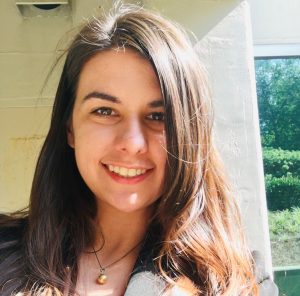
——————————————-At the beginning, I was looking for a PWE where I could develop skills in research and analysis. I found that opportunity with Cybercrime Support Network (CSN). CSN is a non-profit organization that works with individuals and businesses who suffered from online scams as well as other cybercrime attacks. They have a network with organizations in both public (ex. DOJ, Congress) and private sectors where they serve as a bridge for the victims.
I interned as a part-time research analyst. I found and presented data relating to current cyber security laws (both domestic and international) and current programs (both private and public). CSN used the research in multiple reports that were submitted to CISA as well as including it in the Cyber Resource Catalog on their website. The Cyber Resource Catalog is a vetted list of the best resources related to particular cybercrime topics and my research resulted in the addition of several state resources to the catalog. In addition, I translated current cyber laws to Spanish for an international project. It allowed justice professionals to quickly understand how their data might be related to data elsewhere in the world.
The PWE experience with CSN overall introduced me to the global issue with cybercrime and how it has affected billions (especially during the pandemic). It made me realize a possible solution to combat against cybercrime requires an effort between both public and private sectors. It also led me to realize that this is an area in need of public service leadership. This PWE experience overall has given me a chance to utilize my skills that I have gained and discovered throughout the program. In particular, my skills for research and analysis from PUBA 719-720 and PUBA 760. By opening myself to a new opportunity, I was also able to find a mission (combatting cybercrime and promoting justice) I am passionate about that aligned with my skills and values (justice and integrity). Lastly, this PWE experience has shaped my vision for my future career goals in my current job within the Department of Justice as well as within completing the MPA degree.
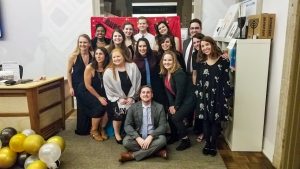
Some of our students gathered in person for the annual Bureaucrat’s Ball.
Hi Everyone!
It is an exciting time in the UNC MPA program! This is the final week of classes, which means the second-year student are about to graduate and the first-year students will begin their Professional Work Experiences (PWEs) very soon. The last week of classes are always busy. All semester-long projects and papers are due while preparing for final exams, or in the case of second-year students, applying and interviewing for jobs. It is a lot to manage, and we have learned the value of resilience and persistence through the program.
If you have been keeping up with the blogs, you may be curious about the results of the Portfolio and final Oral Examinations. If you are a first-time MPA Matters blog reader, the Portfolio and Oral Examination are the thesis equivalents for the MPA program. The second-year students spent the semester distilling major lessons learned throughout the MPA program. The Portfolio was evaluated by a committee of three faculty members. The committee members provided feedback and granted the student the opportunity to defend their Portfolio in front of the committee. The defense portion is called the Oral Examination. For the residential students, all passed both stages, which means we are officially allowed to graduate with a Master of Public Administration from the University of North Carolina, Chapel Hill!
Two years ago, when I first began the MPA program, I experienced tremendous imposter syndrome and questioned if I would be able to see the program through. The journey seemed tough, and I had not yet fully discovered the tenacity that existed within me. I know I experienced and overcame numerous challenges, both personally and academically, while pursuing this degree. I also know that through these challenges, I learned many lessons about myself and others. I learned that I am thankful for the support of many friends and loved ones. I learned that asking for help is acceptable and a sign of strength, as people want to help you succeed. I learned that failure is not inherently bad, but rather an opportunity for growth. Finally, I learned that even during stressful times we can do hard things and should celebrate each win!
During a typical year, the second-year students would be preparing to participate in a public celebration of a two-year win in the making. For the past two MPA cohorts, the graduation ceremony honoring all the hard work of both residential and online students alike has been interrupted by the pandemic. Last year around this time, my cohort was hopeful that the situation would be different by the time our graduation arrived. We were hopeful to share one last memory together in person as the MPA Class of 2021 before we headed into the workforce.
There is a sadness in knowing that the tradition of an in-person hooding and individual graduation ceremony has been interrupted once again. There is also hope and joy in knowing that everything we have experienced in the past year and a half has prepared us for this moment— and I do not just mean our expertise in operating Zoom. Rather, I am reflecting on our creative abilities and dedication to uplifting and celebrating each other with intentionality, even through all the challenges we have experienced. While a virtual graduation ceremony is not how we expected to conclude our experience, each MPA student has earned their time in the spotlight! I am looking forward to the opportunity to express how proud I am of each member of my cohort!